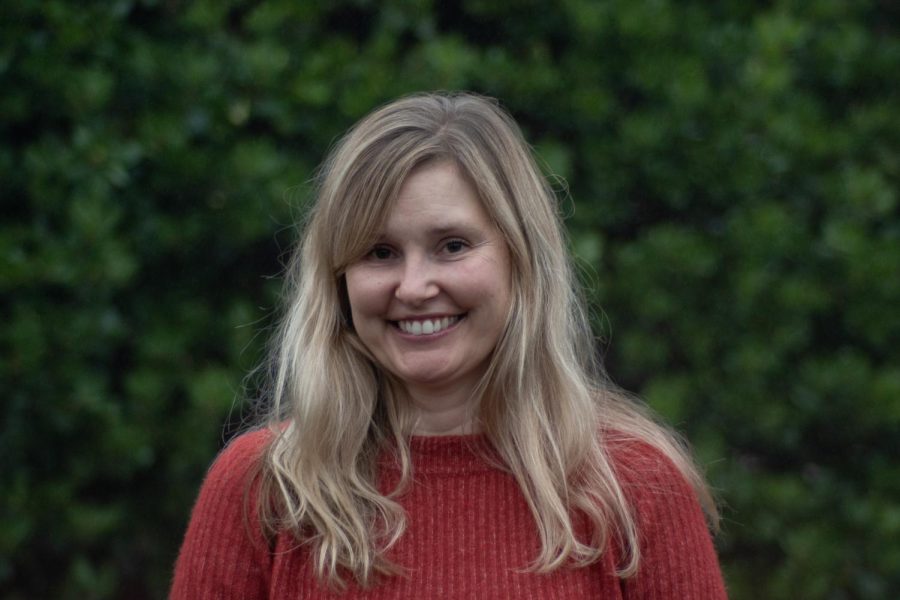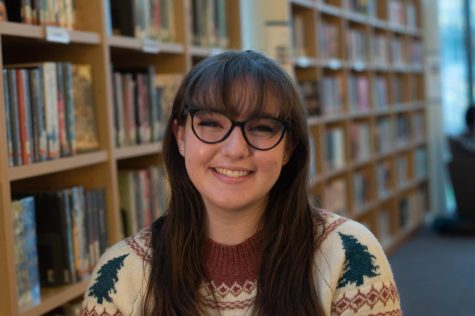To Learning Specialist Ms. Shannon Woodworth, Normalizing Learning Differences Is “Good For Everyone”
“When I do something, I really do it and I really put my heart into it,” said Ms. Shannon Woodworth, who is the new learning specialist at La Salle.
February 2, 2022
Around five months ago, Ms. Shannon Woodworth, the new learning specialist at La Salle, chose to move back to her hometown of Gresham, Oregon with her family. Previously, she had lived in a variety of places across the West Coast of the United States, including Seattle, Washington, and different parts of California.
“We’re movers,” Ms. Woodworth said. “It’s in my blood.”
One aspect of her adventurous lifestyle is that Ms. Woodworth enjoys investing in real estate — buying and selling houses, fixing them up, and then “moving on and finding new places to live.”
Now, Ms. Woodworth is “surrounded by memories” back in Oregon, including night skiing at Ski Bowl, and hiking in the Oregon greenery and rain.
One particular challenge of this move, however, was that it drastically changed the environment for her two daughters — Frannie, who is 7 years old, and Elsie, who is 10 years old. Both had moved previously but had stayed within the same city.
Now, “they were totally out of their element — brand new school, and brand new community — and this was a tough one,” Ms. Woodworth said, so she plans on staying in Gresham until her children graduate.
In the meantime, Ms. Woodworth was a part of the academic counseling team for Bishop O’Dowd High School, a private Catholic school located in Oakland, California. The semester there had already started when Ms. Woodworth moved, so she finished the 2020-2021 school year there remotely.
At Bishop O’Dowd, she helped students with essay-writing, project planning, and submitting missing assignments. “I loved that,” she said. “The minute I got that job, I was like, ‘This is so great. I get to work with kids one-on-one. It’s all about them. It’s all about what they need, and it’s all about helping them succeed.’”
Then, Bishop O’Dowd asked her to work on a peer tutoring program, where Ms. Woodworth collaborated with a group of 15 lead peer tutors and 60 other tutors to help fellow students. They would host tutoring events, study sessions, and workshops.
“I loved doing the peer tutoring program,” she said. “It really was a great balance to me… I got to work one-on-one with the students with the coaching and with academic support, and then I got to work with more of a team of really inspiring, high-level kids that really wanted to take their experiences and share them with their peers and help their peers.”
Now that she is at La Salle, Ms. Woodworth wants to create a similar peer-tutoring program here, most likely with the help of National Honors Society students as tutors. “We have the talent,” Ms. Woodworth said. “We have the tutors. We have students that are there and willing. We just need some organization of how to get it all coordinated.” Ms. Woodworth hopes to organize this over the summer of 2022 to get it up and running in the fall.
One reason that Ms. Woodworth originally looked into La Salle was that her mother was a part of the second graduating class.
After she submitted her application, “it all fell into place so quickly,” Ms. Woodworth said. “The need for La Salle was immediate, they had the interview immediately, and it was like a match made in heaven… Generously, La Salle saved the position for me, and let me finish up my job with Oakland.”
A part of why Ms. Woodworth felt the need to complete her semester at Bishop O’Dowd was because she describes herself as a “passionate” person — “when I do something, I really do it and I really put my heart into it,” she said. “I gave that commitment to O’Dowd, and now I’m here and I’m giving this commitment to La Salle.”
Here at La Salle, “my job is to help students access learning the way that they need it the most,” Ms. Woodworth said. “The way I look at it is, teachers are here to teach the students, and I’m here to help the students be able to learn what the teachers teach them.”
To do so, Ms. Woodworth has a caseload of students with learning differences that have “hindered the students’ learning in some way,” and are diagnosed by a doctor — for example, ADHD or dyslexia, she said.
“I’m here to make sure that we can give them a setting that will help them learn, even though they have those differences,” Ms. Woodworth said. “I try to help them learn ways that they can help themselves in their classes, and I help teachers try to incorporate some accommodations to help the students be able to learn in their classes.”
To identify who is a part of this caseload, Ms. Woodworth works with the admissions team, students, parents, and finally, the counseling team.
When a student first applies to La Salle, “they’ll let us know if they have any learning differences,” Ms. Woodworth said. This gives Ms. Woodworth time to work with the student and decide if La Salle is a good fit for them and make recommendations on what La Salle can do to accommodate them.
“And if it is a good fit for them, then I will be here with them all four years,” Ms. Woodworth said, so she can “work with them year by year as their academic rigor changes.”
In order to set up a plan for students, she typically meets with the student and their parents at the beginning of the year and asks about how they have learned in the past and what has previously been helpful for their learning. Then, she goes to the student’s teachers and describes the learning plan she has put together with the student to see if that works in their classrooms.
However, for this year, because Ms. Woodworth entered La Salle partway through the semester, she has a list of students with learning accommodations that she has been checking in with.
“We’re a good team,” Ms. Woodworth said, speaking about her experience working with La Salle’s counselors. “I appreciate all of their work… Being new to the school, I really have to rely on them a lot because they know [students] a lot better than I do.”
Even though Ms. Woodworth has a specific caseload of students, she said everyone learns in a variety of ways. “We’re dynamic people, and we need to be able to learn in the ways that suit our needs the most,” she said. “Unfortunately, our education system is set up to where we really have to kind of have a cookie-cutter system… But I feel like in the last, you know, 10, 20 years, we’ve gotten a lot better about incorporating differences into the classroom to be able to access everyone.”
That is one reason that Ms. Woodworth wants to expand the Study Lab class at La Salle. Currently, the Study Lab class consists of three periods which range from about 10 to 15 students — Ms. Susan Pinto, a math teacher and technology department assistant at La Salle, teaches one period, while Ms. Woodworth teaches the other two periods.
To Ms. Woodworth, Ms. Pinto has “done a phenomenal job with that class,” she said. “She really helps guide the students to advocate for themselves, to follow through, and to get organized.”
Study Lab differs from an Honors Pass or iStudy period by it not being an open work time — there are assignments, and the course counts for a credit. “It’s intended to be a support class,” Ms. Woodworth said. It provides “one-on-one instruction to help them get to where they need to be and stay where they need to be.”
While “the students who take this class have been flagged as students that might need extra help or might need an extra space to be able to get work done,” Ms. Woodworth said, “not all students in those classes have learning disabilities or learning challenges, but all students in that class can benefit from organizational skill-building.”
“It’s really great,” Ms. Woodworth said. “I wish everybody could take it, at least one semester, so that you could kind of learn, this is how you plan.”
In addition to expanding the Study Lab class, in the future, Ms. Woodworth hopes to work more with her colleagues to “see new ways to help their students,” especially with normalizing learning differences in the community.
“There’s a big stigma with learning disabilities — and I don’t even like using the word disability, it’s not a disability, it’s a difference,” Ms. Woodworth said. “It’s different learning, and we’re different people. Of course, we learn differently.”
To Ms. Woodworth, the word differences versus disabilities “takes the negative out of it,” she said. “I just want to focus on the fact that we all have abilities, and we learn them in different ways … I don’t want students to feel ashamed or uncomfortable talking about how they learn.”
“We just need to think about how to reach everybody, and I feel like, in the last couple years, inclusion has been such a big vocabulary word for us,” Ms. Woodworth said. “And I think it goes bigger than who we are in terms of the color of our skin and our gender, it goes to our characters. Let’s embrace this idea that we’re all unique people and embrace the differences.”





